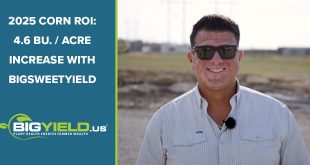
Kent Kauffman discusses aluminum content in soils, and how high aluminum levels can create problems for growers.
Listen to Kent Kauffman of the BigYield.us team and Kyle Hill, Ag 1280 Farm Director, each Monday, Wednesday, and Friday on Ag 1280 KDKD-AM. The segments air at 7:15 am and again at 12:15 pm.
This segment originally aired on May 17, 2017.
Audio Transcription
Kyle: Once again we have the BigYield Spotlight. I’m Kyle Hill, visiting with Kent Kauffman of BigYield.us. Welcome back.
Kent: Thanks for having me Kyle.
Kyle: And today we’re talking about aluminum in fertilizers. First of all, what can you tell us about aluminum and its relationship with the soil?
Kent: One big thing to realize is aluminum is the most abundant metal in the earth’s crust. Even without a high amount of aluminum in the soil, most people are going to average around 70,000 parts-per-million (ppm) in a soil test. You’re going to see a lot of aluminum there. It’s a non-essential nutrient for most plants. However, it can sometimes cause problems in large amounts.
Kyle: What kind of problems are we talking about?
Kent: First off, there are two types of soil test measurements that measure aluminum. There’s the M3 aluminum measurement and there’s also an aluminum with 3 addition signs next to it. This is a positive ion on aluminum. The M3 aluminum measurement has no relationship to the available aluminum in the soil. So, it’s in the soil, but your plant can’t use it. It’s not going to cause any problems. That one is okay. The positive aluminum ion, that Al+++, that is all the available aluminum – that is what your crops are going to take up. When you have a lot of this, it can be toxic to your crop and cause some issues.
Kyle: What kind of issues?
Kent: Some of the issues that you’re going to see, first you want to do your soil test and that will tell you how much is there. Another thing you’re going to see is you’re going to notice a low pH. If you have a pH below 5, then most likely you’re going to have aluminum issues. From 5 to 6, you’re going to have some aluminum issues, but definitely below 5. What this acidic soil and high aluminum soil toxicity does, is you’re going to see stunted roots. The reason why you’re going to see these stunted roots is aluminum reduces the availability of phosphorus because it forms an aluminum-phosphate compound. It does the same thing with sulfur, it forms an aluminum-sulphate compound. It does this with quite a few different nutrients in your soil with this competitive interaction. So that’s one of the things you want to look for in your fertilizers because if they have a lot of aluminum, then it’s going to decrease the effectiveness of that fertilizer and how many of those nutrients your crops can take up.
Kyle: How are these toxic levels of aluminum being introduced into the soil?
Kent: A lot of the fertilizers, especially some of the lower cost / cheaply made fertilizers, they can have an excess of aluminum in them. That introduces that aluminum to your soil. Your soil already has a great deal of aluminum in it, but because of the way some of these fertilizers are made, you will get that positive aluminum ion that is biologically available to your plants in the soil. That will cause issues. We’ve actually had some of those issues on the research farm with some of the fertilizers that we’ve used in the past. We’re trying to correct those issues by applying better fertilizers now, applying lime, applying other things to bond with that aluminum as well. Both in our usage on the farm and in our BigYield product line, we’ve introduced the highest quality fertilizers. That way you’re not having issues and getting the most NPK, sulfur, and the rest of the nutrients your crop needs to grow.
Kyle: What successes have you see so far?
Kent: We’ve definitely decreased the aluminum in our soil. We’ve been increasing yield. Because of this we’ve been able to reduce our fertilizer usage in some parts of the field, which is really nice. It’s just a matter of staying on top of it, doing soil tests, checking out roots, digging up some plants and seeing what’s there. That’s what we’ve done. We have very high quality 3-18-18 fertilizer in our BP In-Furrow and in general, we make sure it’s the highest quality ingredients going into our crops.
Kyle: If anyone has questions about high-grade fertilizer how can they get ahold of you Kent?
Kent: They can get ahold of us multiple ways. First, we have a toll-free number, 844-242-4367. Again it’s 844-242-4367. They can check out our website, www.BigYield.us. They can check us out on Facebook as BigYield.us.
Kyle: Kent we thank you very much for visiting with us today and sharing your perspective. Again, I’m looking forward to our next conversation.
Kent: Thank you very much.
 BigYield High Yield Soybeans, High Yield Corn, and High Yield Wheat
BigYield High Yield Soybeans, High Yield Corn, and High Yield Wheat



